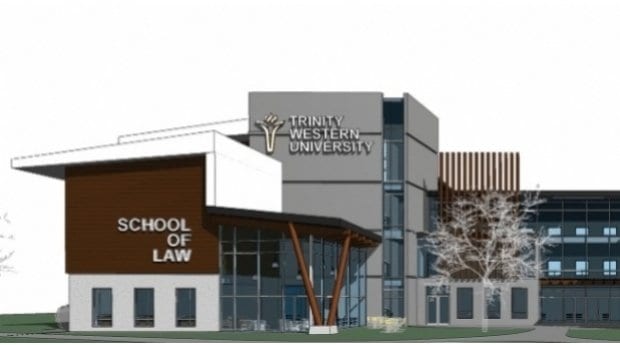Two LGBT groups are joining the fray over whether the Law Society of Upper Canada (LSUC) will accredit students graduated from a controversial Christian university in British Columbia.
Out on Bay Street, a development group for young lawyers and professionals, and OUTlaws, an LGBT law student group with chapters at four Ontario law schools, have applied for intervenor status in Trinity Western University’s (TWU) appeal of LSUC’s decision to deny accreditation to graduates of their law school.
The intervenor status motion for Out on Bay Street and OUTlaws will be heard by the Ontario Divisional Court on Sept 3. A ruling is expected later in the year.
A 2001 Supreme Court of Canada decision upheld TWU’s right to teach Christian values and to insist that its students sign a covenant agreeing to uphold Christian biblical teachings, prohibiting premarital sex and homosexuality. If students break the covenant they can be disciplined, expelled or refused readmission to the university.
Douglas Judson, a member of Out on Bay Street’s board of directors, says the issue is not whether a Christian law school can provide competent legal education, but whether its policies are discriminatory. “When you say that certain people of a certain identity don’t have access to [a law school] or are systematically made to feel ostracized within them, that becomes a problem,” he says.
Out on Bay Street and OUTlaws have already been vocal in their opposition to allowing TWU students to become accredited lawyers in Ontario. Katelyn Scorer, the president of the University of Windsor’s OUTlaws chapter, says her group has been protesting against TWU’s policies from the beginning.
“Already in Canada, spots in law schools are coveted and very hard to come by,” she says, adding that she worries TWU is creating criteria for law school admission that isn’t based on merit. “It’s based on who you are as a person at your core and who you are sexually intimate with and how you identify.”
Scorer and Judson believe that they deserve to have a voice in the proceedings because the decision of the court will affect future law students the most. “We’re coming as LGBT individuals with our own special experiences and lived experiences, which provide, I think, the most meaningful dialogue of what this community covenant would do to this population,” Scorer explains.
TWU president Bob Kuhn says the view that the community covenant limits the number of spots in law schools for LGBT students is incorrect. “There’s no question that the number of students, small though they may be, that come to school at TWU may have a greater affinity for TWU’s community values, the community covenant and perspective,” he says. “But the reality is that those would be places left behind at other universities.”
While Kuhn supports Out on Bay Street and OUTlaw’s right to express their opinion should their application to become intervenors be allowed, he believes that the law supports TWU.
“To suggest that Christians aren’t allowed to have their viewpoints is perhaps the opposite of anti-gay or homophobic. It’s anti-Christian,” he contends.
The law societies of Alberta, Saskatchewan, New Brunswick and other provinces have already accredited TWU’s law school. The government of British Columbia approved the law school in December 2013, though documents recently uncovered by The Province found that a panel of experts hired to advise on whether to approve the law school had major concerns about the quality of education that would be provided at TWU.
The Law Society of British Columbia originally approved accreditation for graduates in April 2014 but decided to reconsider after members protested the decision. The Nova Scotia Barristers’ Society voted to conditionally approve the law school if TWU exempted students from signing the community covenant or amended it so it no longer discriminates.


 Why you can trust Xtra
Why you can trust Xtra


